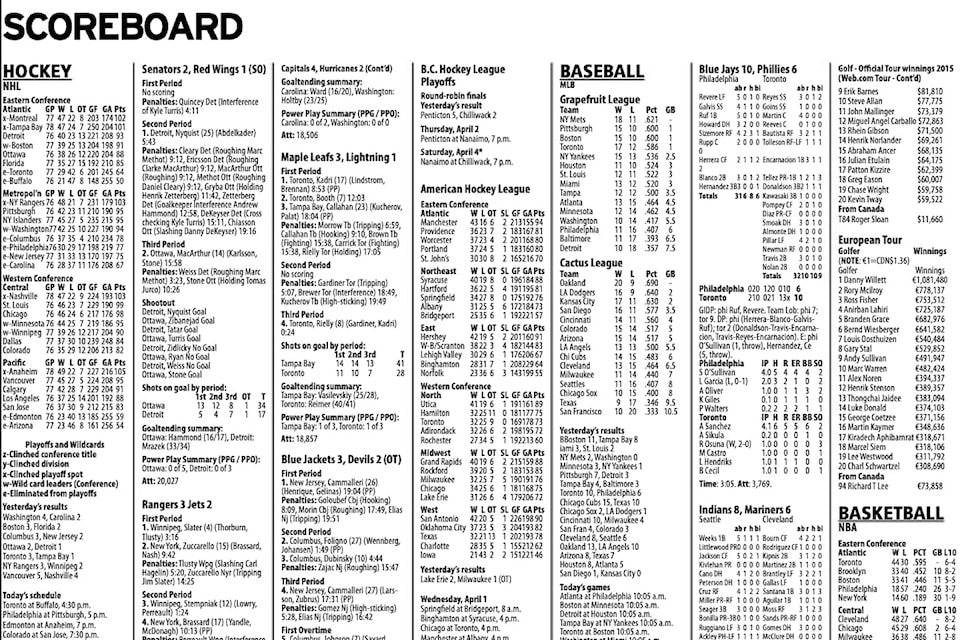Top Stories
Sports Viewing Evolution: From Newspapers to Smartphones

The landscape of sports consumption has undergone a dramatic transformation over the decades, evolving from the simplicity of newspaper scoreboards to the instant access provided by smartphones and streaming services. Philip Wolf, editor of PQB News, reflects on his own journey as a sports fan, illustrating how advancements in technology have changed not only how fans consume sports but also their emotional connection to the games.
In the early years of Wolf’s life, mornings began with a ritual: rising before dawn to grab the newspaper and scour the sports section. The scoreboard page was essential, providing the only way to stay updated on his favorite teams. During a time when the internet was nonexistent and VCRs were a futuristic concept, this printed information served as the lifeblood for sports enthusiasts. The thrill of seeing scores like “Canadiens 12, Penguins 0” brought joy that resonated throughout the day.
As technology progressed, watching sports became more accessible. The introduction of small personal televisions allowed fans to enjoy games in their own rooms, albeit with limited channels. This shift marked the beginning of “appointment television,” where viewers eagerly awaited broadcasts to catch highlights from notable events. TSN became a staple for many, further enhancing access to sports highlights and commentary.
The 1990s represented a peak in this traditional era of sports viewing. Friends and fans alike reveled in the distinct commentary of broadcasters like Van Earl Wright, whose signature phrases became part of the sports lexicon. The excitement surrounding the evening highlights and the statistics printed in newspapers fueled the camaraderie of sports fandom.
Yet, as time marched on, so did the modes of consumption. Today, information flows in an instant. Fans can check live scores and watch highlights seconds after they occur, using devices that keep them connected to every game. Despite this convenience, Wolf expresses a sense of loss regarding the connection he once felt with the sport.
“I used to know every player in every league and have the career stats of all my favorite players committed to memory,” he notes. Now, the experience is different; he finds himself searching for information on players he has never heard of, realizing they are seasoned veterans. This shift raises questions about the depth of engagement in the modern sports experience.
While the advancements in technology have made sports more accessible than ever, the emotional connection seems to have waned. For Wolf, and possibly many fans, the essence of sports fandom has become diluted. The magic of eagerly waiting for the next day’s newspaper or reliving the excitement of a game through highlights is overshadowed by an overwhelming abundance of information.
As sports consumption continues to evolve, it highlights a broader cultural shift in how audiences engage with their passions. The nostalgia for simpler times remains strong, even as the conveniences of today offer new ways to experience sports. Wolf concludes with a reminder of the joy that once came from traditional sports consumption, a sentiment that resonates with many who have witnessed the rapid changes in the world of sports.
-

 Science2 months ago
Science2 months agoToyoake City Proposes Daily Two-Hour Smartphone Use Limit
-

 Health2 months ago
Health2 months agoB.C. Review Reveals Urgent Need for Rare-Disease Drug Reforms
-

 Top Stories2 months ago
Top Stories2 months agoPedestrian Fatally Injured in Esquimalt Collision on August 14
-

 Technology2 months ago
Technology2 months agoDark Adventure Game “Bye Sweet Carole” Set for October Release
-

 World2 months ago
World2 months agoJimmy Lai’s Defense Challenges Charges Under National Security Law
-

 Technology2 months ago
Technology2 months agoKonami Revives Iconic Metal Gear Solid Delta Ahead of Release
-

 Technology2 months ago
Technology2 months agoSnapmaker U1 Color 3D Printer Redefines Speed and Sustainability
-

 Technology2 months ago
Technology2 months agoAION Folding Knife: Redefining EDC Design with Premium Materials
-

 Technology2 months ago
Technology2 months agoSolve Today’s Wordle Challenge: Hints and Answer for August 19
-

 Business2 months ago
Business2 months agoGordon Murray Automotive Unveils S1 LM and Le Mans GTR at Monterey
-

 Lifestyle2 months ago
Lifestyle2 months agoVictoria’s Pop-Up Shop Shines Light on B.C.’s Wolf Cull
-

 Technology2 months ago
Technology2 months agoApple Expands Self-Service Repair Program to Canada









